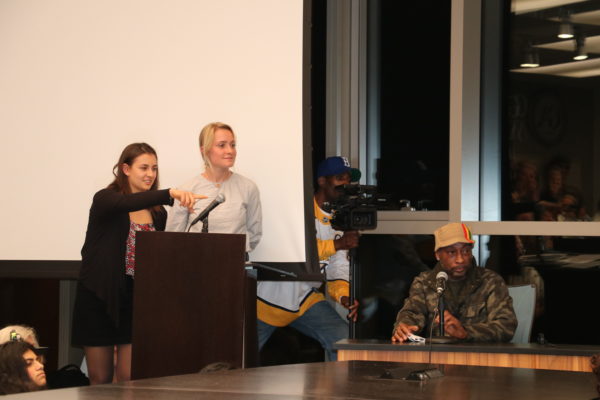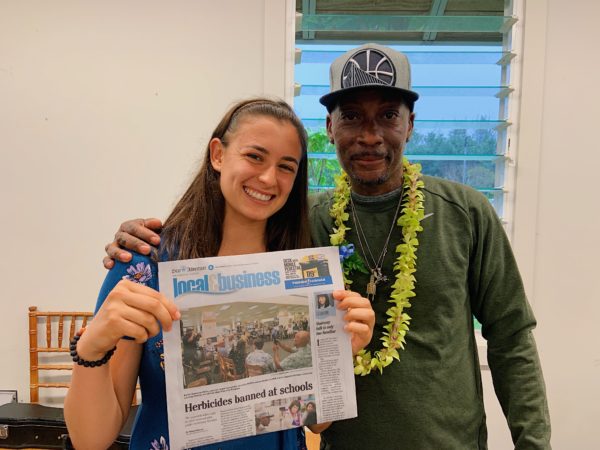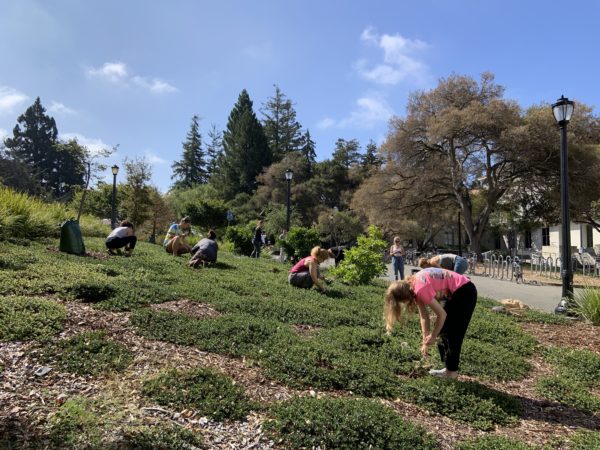Mackenzie Feldman, Founder of Herbicide-Free Campus has been working to end herbicide use by the University of California campus system. This May, the University announced a ban on glyphosate citing “concerns about possible human health and ecological hazards”.
ISN: What events caused you to protest chemicals on your campus?
Recently at the 2019 Brower Youth Awards (video), I spoke about some of the defining moments that catalyzed my activism. During my time at UC Berkeley, I took an environmental biology class taught by Dr. Ignacio Chapela. On one of our field trips, Professor Chapela told our class that herbicides like Roundup were sprayed on campus. I was shocked, and I wanted to do something about this. I wrote a research paper on this subject for class, titled “Can the Campus of UC Berkeley Be Turned Into an Herbicide-Free Campus?” but didn’t know what to do from there.

As I reflect back now, I suppose it was only a matter of time before I found the moment that would propel me into action. I began to exercise my activism after a personal experience made me realize I had no other option. During my time at UC Berkeley, I was a student-athlete on the Beach Volleyball team. When I showed up for practice one day in the Spring of 2017, our coach cautioned us not to chase after the balls if they rolled off the court because the surrounding area had just been sprayed with an herbicide.
My teammate Bridget Gustafson and I were shocked, and we spoke with the Athletics Grounds Manager to ask what herbicide was applied and how often. He told us that he sprays the Monsanto product “Ranger” once a year all around our courts. Ranger contains 41 percent glyphosate, the active ingredient in Roundup. I knew that the California Office of Environmental Health Hazard Assessment (OEHHA) had determined that glyphosate would be added to the list of Proposition 65 chemicals known by the state to cause cancer. Additionally, glyphosate has been identified as a contributor, even at low doses, to autism, Alzheimer’s disease, depression, ADHD and many other illnesses.
I was shocked that we were being exposed to chemicals in our everyday environment. This realization, combined with my passion for protecting the environment is what set my activism into motion. I wrote about this day at the volleyball courts in an Op-Ed for The Daily Californian, which garnered much attention to the issue, and from there, our campaign was born.
ISN: Tell us about your campaign to ban all synthetic herbicides on your campus?
Soon after this day at practice and the article was published, Bridget Gustafson and I decided to start Herbicide-Free Cal, a campaign to ban herbicides at UC Berkeley. To be clear, the campaign is about banning all synthetic herbicides, not just Roundup. More specifically, this campaign is about teamwork.
Step 1: We have put a lot of our efforts into developing personal relationships with the groundskeepers on campus. When we met with the Athletic Grounds Manager, he agreed to stop spraying near our courts as long we could figure out how to manage the weeds without herbicides. So our team began having weeding days before practice. As we expanded our efforts campus-wide, we worked with the UC Berkeley ASUC Student Government to put together an herbicide-free student team, and together we began to hold educational events and host weeding “work-days” where students pick weeds or mulch with the groundskeepers. We also passed a Resolution stating that we wanted an herbicide-free campus.
Step 2: Beyond Pesticides: Thanks to Parents for a Safer Environment, who heard about us from the Op-Ed, we were given a grant that allowed Beyond Pesticides to come to UC Berkeley, and bring Professional Horticulturist Chip Osborne to teach the groundskeepers how to manage the landscapes without the use of chemicals. We initially chose two test sites: Memorial Glade and Faculty Glade. This was a huge test for the sustainability of the campaign, as we would monitor this model before expanding. Later, we used it as an example for other schools looking to transition away from herbicide use.
Step 3: Food and Water Watch: At this point in the campaign, we had the passion and were acquiring the tools, but needed to learn how to combine them to create active, permanent change. The non-profit organization Food and Water Watch taught me and Bridget campaign strategy. This included leadership development, digital organizing tools, student recruitment, and how to align our vision with university-wide policy. One of the most important tools I gained was how to teach other students to start and lead a campaign. Empowering others has allowed this campaign to multiply across the country. We have expanded this campaign to schools across the UC-system, and then began to expand to schools nationwide. Food and Water Watch published this article on the work we did together.
ISN: How did you meet Dewayne ‘Lee’ Johnson?
I met Lee Johnson at the Dewayne Johnson v. Monsanto trial on August 7th, 2018, in a San Francisco courtroom.
During closing arguments, when the Monsanto lawyer was speaking, I simply could not listen anymore. I was sitting with my mentor Anna Lappé, and I felt moved to write Lee a note, so I took out a spare piece of paper and composed my thoughts. I explained that Hawaii, where I am from, is ground zero for industrial agriculture, and many people, especially Native Hawaiians, are getting sick from pesticides. I also told him about the campaign we started at UC Berkeley, and how we are trying to eliminate these cancer-causing chemicals from our campus. I left my email for him and passed the letter to the lawyer sitting in front of me, who passed it to Lee. Later that day, as we were sitting in the courtroom, Anna Lappé whispered to me that I needed to expand this campaign. I knew she was right.
On August 10th, I was back in the courtroom for the final verdict. My mom and I were on the edge of our seats. The verdict was announced-Lee Johnson had won! This day was incredibly emotional for everyone. I hugged Mr. Johnson and cried, and I could feel how significant this moment was, how important this day would be in history. A few days later after the trial, Lee Johnson emailed me. He asked how he could help with our campaign.
ISN: How did your campaign spread to Hawai’i?
Hawaii, where I was born and raised, is my home. Hawaii is ground zero for industrial agriculture, and 17 times the amount of pesticides are sprayed in Hawaii compared to the mainland United States, resulting in cancer clusters and birth defects. I learned all about this in high school, and since then, it has been an issue incredibly close to my heart.
It was important to me that eventually, my efforts would expand to Hawaii, so that I could give back to a place that has given me so much. This summer, I had the opportunity to partner with the Protect Our Keiki Coalition and return to Hawaii with Lee Johnson and his family. The visit was part of the Coalition’s efforts to continue to educate the public, teachers, groundskeepers and policy-makers about moving away from carcinogenic pesticides that are currently used year-round in the islands, at great risk to public health. This multi-island speaking tour, featuring Lee Johnson, allowed Lee to share his story with community leaders, policy makers and government officials. To see how this journey unfolded, watch this video.
During this trip, immediately after a Board of Education community meeting with Johnson, the Hawaii Department of Education issued a memo prohibiting herbicide use on all island-wide school grounds. So I suppose my campaign spread to Hawaii because it is my home, but also because it is a state deeply in need of this reform. Our work there was a huge victory and I am determined to continue this work in every state, and around the world. You can read about my reflection from the trip here.

In Hawaii specifically, the work is not over yet. As of September 2019, the counties of Maui, Hawaiʻi and Kauaʻi are actively working towards implementing pesticide and herbicide-free county parks and roadways.
ISN: What do you say to people who have concerns that institutions that ban Roundup will replace it with compounds that are perhaps even worse?
This question is exactly why we are not Glyphosate-Free or Roundup-Free Campus. We are “Herbicide- Free Campus.” I would say that activists need to be cautious when fighting for reform, that institutions don’t just replace glyphosate with barricade or glufosinate, for example. Moreover, there are other herbicides used on campuses like 2,4-D and dicamba that are worse, so it’s best not to focus on glyphosate. At the same time, liability concerns around glyphosate have a lot of schools, cities, and states worried about potential litigation, and this factor can be used as meaningful dialogue to initiate stakeholder engagement.
ISN: Why were Baum Hedlund (the law firm that represented Mr. Johnson) successful in a Monsanto lawsuit when others have not been, do you think?
This is a question that involves a number of layers of detail. To give you the most accurate information, I have reached out to representatives of the Baum Hedlund firm.
It is not true that others have not been successful. Only three cases have gone to trial and there, they have won. Baum Hedlund co-tried the first and last trials (Johnson and Pilliod) with the Miller Law Firm. Furthermore, Baum Hedlund paired with Aimee Wagstaff and Jennifer Moore to assist with the second trial (Hardeman). The trial teams in all three cases were very fortunate to win on behalf of the plaintiffs. What is also of interest is the momentum that this has carried into 2020. There are six more trials scheduled for 2020 for 37 plaintiffs – see the Baum Hedlund trial schedule page.
In terms of the details of the actual trials, the success comes down to evidence and the jury. The Baum Hedlund legal team, on the Monsanto cases, is deeply educated about the chemicals. Presenting numerous studies linking Roundup to Non Hodgkin’s Lymphoma, along with the experts who explain what they mean, and trusting that educated juries will understand, has been a straight-forward method leading to success.
ISN: As advertisements appear seeking potential victims of glyphosate exposure, what do people need to know about the law firms who advertise? Are they all equally competent and effective?
There are many law firms now advertising for Roundup clients, especially after the second and third verdicts were handed down. Moreover, since the Baum Hedlund law firm discovery documents are public record, any lawyer can take that information and use it in court. For anyone seeking a claim for their Roundup or Non Hodgkin’s Lymphoma damages, it is important to carefully study the firm(s) of interest and find out as much as possible about their record.
The competency and effectiveness of a firm depends on the litigation and trial history of each firm. If someone is worried about this, they can look at this document which shows the attorneys appointed to the Plaintiffs’ Steering Committee (leadership) for the federal multi-district litigation.
A word of caution: many law firms have jumped on the band-wagon and some are pressuring people with deadlines and other techniques. Those would be firms to steer clear of. Compare what one might offer relative to others. A straight 40% fee is about the norm, and a Mass Tort (where each client’s settlement will vary according to their specific losses) is far better than a Class Action (where settlement amount for all clients is the same).
ISN: Have Lee Johnson and his family yet received any compensation following their court victory?
As far as I know, he still has not been awarded compensation. Lee Johnson was initially awarded $289 million, which was reduced to $78 million on Oct. 22, 2018.
ISN: Currently, many communities are banning herbicides. What advice can you give communities that have yet to make that step?
I think the biggest piece of advice I would offer is to understand where the groundskeeper workers are coming from, and then partner with them. They are being instructed by their supervisors, therefore it is not their fault, but rather the fault of a larger systemic problem–the way we view and treat our natural world. It may take more labor to maintain an organic landscape, but as we fight for systemic change, we must support the groundskeepers every step of the way through this transition by being their allies.
If you are a student and are interested in bringing this campaign to your school, or a community member interested in getting involved, visit the website and fill out the Get Started form! Additionally, feel free to contact us at herbicidefreecampus(at)gmail.com.

What are your future plans?
I am looking forward to advancing the momentum from the Brower Youth Award in order to grow the campaign. My goal for Herbicide-Free Campus is to continue expanding to schools nationwide, ensuring that every school discontinues the use of synthetic herbicides and transitions to organic land care maintenance. My other priorities are advocating for farm worker safety by forcing the EPA to write more stringent regulations and enforce them, and to make sure that part of the Green New Deal includes replacing herbicides used in agriculture with regenerative farming solutions. In general, there is systemic change that is necessary for our country, and I intend for my campaign to be part of that solution.
Any day now, the University of California system will decide whether or not to renew its ban on glyphosate-based herbicides, including Roundup — on their campuses Tell UC President Napolitano to permanently ban glyphosate and adopt organic land management
If this article was useful to you please consider sharing it with your networks.



Very beautiful work!! Thank You 🙂 Hope this goes in India